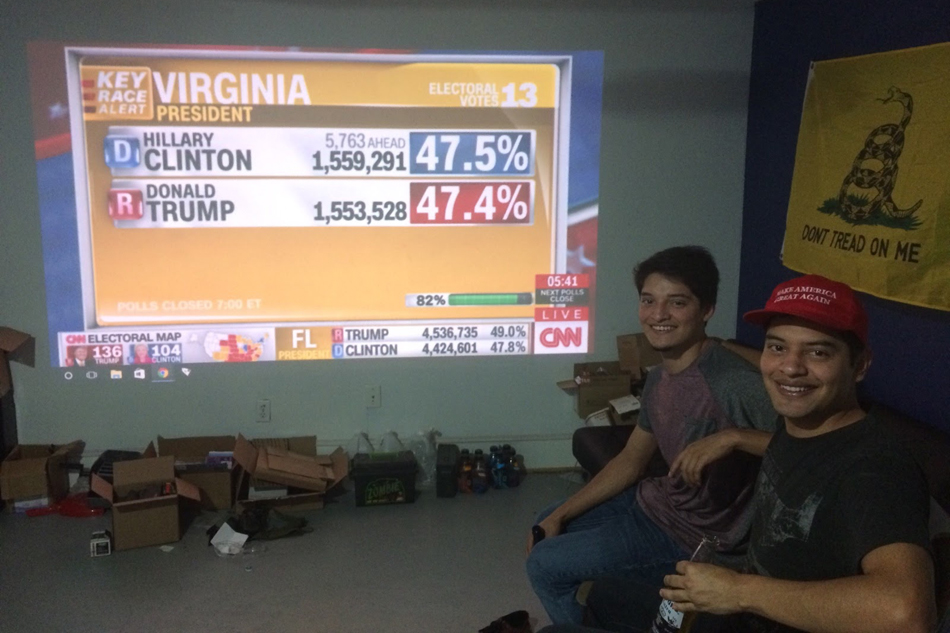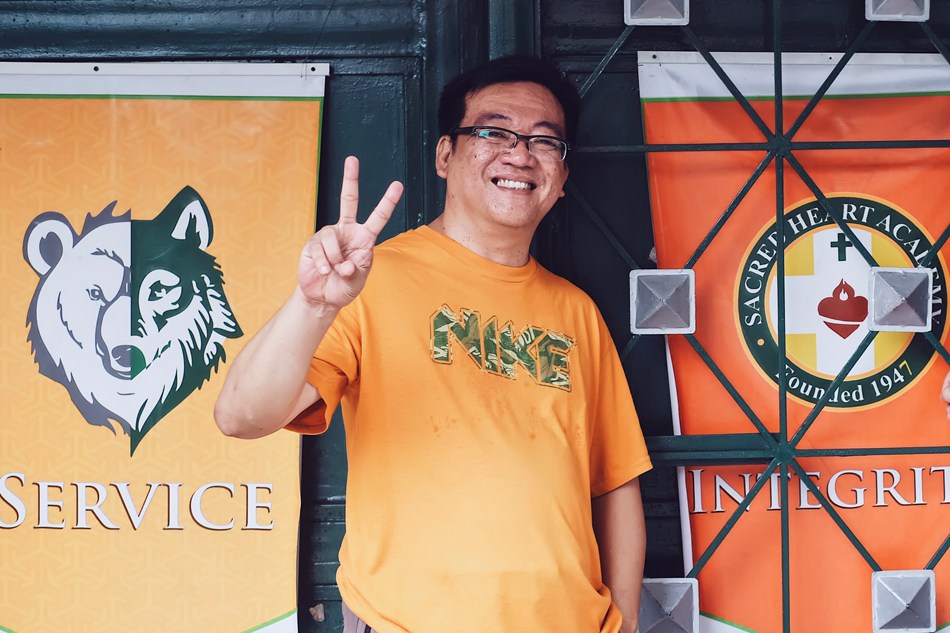From Trump to Duterte: More Than Numbers | ABS-CBN
ADVERTISEMENT

Welcome, Kapamilya! We use cookies to improve your browsing experience. Continuing to use this site means you agree to our use of cookies. Tell me more!
From Trump to Duterte: More Than Numbers
From Trump to Duterte: More Than Numbers
Karim Raslan
Published Nov 26, 2017 12:20 PM PHT
I recently gave a talk at the Communications ASEAN Summit in Kuala Lumpur. There I was, a tukang cerita (or storyteller) among techies, start-up founders and data evangelists.
I recently gave a talk at the Communications ASEAN Summit in Kuala Lumpur. There I was, a tukang cerita (or storyteller) among techies, start-up founders and data evangelists.
The message of the multiple speakers was loud and clear: Goodbye subjectivity, the 21st Century is the age of Big Data (i.e. the ability to process huge data sets-quintillions of bytes of information). But is it really?
The message of the multiple speakers was loud and clear: Goodbye subjectivity, the 21st Century is the age of Big Data (i.e. the ability to process huge data sets-quintillions of bytes of information). But is it really?
Last year, at the height of US elections, I was in Houston, Texas spending some time with the Vidanas, two Mexican-American brothers living in the suburbs of the oil-rich city. The two gun-loving conservatives were staunch Donald Trump supporters despite their Latino heritage. This was puzzling to me: the Orange One had threatened to build a wall and kick out people like them!
Last year, at the height of US elections, I was in Houston, Texas spending some time with the Vidanas, two Mexican-American brothers living in the suburbs of the oil-rich city. The two gun-loving conservatives were staunch Donald Trump supporters despite their Latino heritage. This was puzzling to me: the Orange One had threatened to build a wall and kick out people like them!
But after spending a few days with them, hanging around local taquerias (taco joints), marvelling at their little gun shop, speaking to their parents (and cousins and grandparents and so on), I got a sense of why they might look up to Trump.
But after spending a few days with them, hanging around local taquerias (taco joints), marvelling at their little gun shop, speaking to their parents (and cousins and grandparents and so on), I got a sense of why they might look up to Trump.
ADVERTISEMENT
Sitting in their backyard—where a drug dealer had left bullet holes in their fence—I could feel their frustration with the status quo, their desperation for change that no survey asking to rate their disappointment on a scale from 1 to 10 could really capture.
Sitting in their backyard—where a drug dealer had left bullet holes in their fence—I could feel their frustration with the status quo, their desperation for change that no survey asking to rate their disappointment on a scale from 1 to 10 could really capture.
On polling day, The New York Times posted a prediction that there was an 85 percent chance for a Clinton victory. After weeks of speaking face-to-face with ordinary people from different walks of life all over the United States, I wasn’t so sure.
On polling day, The New York Times posted a prediction that there was an 85 percent chance for a Clinton victory. After weeks of speaking face-to-face with ordinary people from different walks of life all over the United States, I wasn’t so sure.
That night, while sitting in a hotel in semi-rural Michigan (as it happened, the epicentre of the pro-Trump wave), I had a sinking feeling that the “former” reality TV star would come out on top.
Much to my dismay, he did. The pundits were devastated and have probably not recovered from the blow.
That night, while sitting in a hotel in semi-rural Michigan (as it happened, the epicentre of the pro-Trump wave), I had a sinking feeling that the “former” reality TV star would come out on top.
Much to my dismay, he did. The pundits were devastated and have probably not recovered from the blow.
In the end, a naïve reliance on data-alone failed us.
In the end, a naïve reliance on data-alone failed us.
Don’t get me wrong: it’s important. GDP growth, inflation, unemployment rates, gross revenue—all these facts and figures form the backbone of any proper analysis.
Don’t get me wrong: it’s important. GDP growth, inflation, unemployment rates, gross revenue—all these facts and figures form the backbone of any proper analysis.
But in a world drowning in data, knowing the numbers just isn’t enough.
But in a world drowning in data, knowing the numbers just isn’t enough.
Facebook collects information on every post you like, Google records every search you make and Instagram remembers every photo you uploaded.
Facebook collects information on every post you like, Google records every search you make and Instagram remembers every photo you uploaded.
We sign away our privacy and allow Big Brother to know the minutiae of our lives, sometimes even more than our closest friends and family.
We sign away our privacy and allow Big Brother to know the minutiae of our lives, sometimes even more than our closest friends and family.
This deluge of data has brought customized conveniences such as Apple’s Siri, but at what cost?
This deluge of data has brought customized conveniences such as Apple’s Siri, but at what cost?
Recently, it was revealed that there was a massive leak of 46 million mobile users’ information in Malaysia, exposing home addresses, national identity card numbers and in some cases, medical records.
Recently, it was revealed that there was a massive leak of 46 million mobile users’ information in Malaysia, exposing home addresses, national identity card numbers and in some cases, medical records.
Some have had unknown mobile numbers signed up on their behalf. The incident revealed the dark side of data—more information can mean more risk.
Some have had unknown mobile numbers signed up on their behalf. The incident revealed the dark side of data—more information can mean more risk.
At the same time, we must be cautious of turning data into a fetish. The past few years have seen pollsters, riding on a wave of Big Data enthusiasm, rise to rock-star status within the political punditry circuit—only to be smacked in the face with their dead-wrong predictions.
At the same time, we must be cautious of turning data into a fetish. The past few years have seen pollsters, riding on a wave of Big Data enthusiasm, rise to rock-star status within the political punditry circuit—only to be smacked in the face with their dead-wrong predictions.
Too many polls failed to see the ascendancy of Trump, Brexit and the emergence of ethno-nationalist movements across Europe.
Too many polls failed to see the ascendancy of Trump, Brexit and the emergence of ethno-nationalist movements across Europe.
In her book “Weapons of Math Destruction”, Harvard-trained mathematician Cathy O’Neil warns of the dangers of blind faith in big data. She argues that “objectivity” is a “marketing trick”, demonstrating that opaque algorithms riddled with faulty assumptions in fact reinforce human bias.
In her book “Weapons of Math Destruction”, Harvard-trained mathematician Cathy O’Neil warns of the dangers of blind faith in big data. She argues that “objectivity” is a “marketing trick”, demonstrating that opaque algorithms riddled with faulty assumptions in fact reinforce human bias.
Sometimes, sticking to the data we know can trap us in history. After all, there is no data for new and untested ideas.
Sometimes, sticking to the data we know can trap us in history. After all, there is no data for new and untested ideas.
All this goes to show that data is not destiny.
All this goes to show that data is not destiny.
But neither should we blindly follow our instincts.
But neither should we blindly follow our instincts.
Instead, human insight coupled with information is the way forward.
We need to be data-informed, not data-driven. There is a difference.
Instead, human insight coupled with information is the way forward.
We need to be data-informed, not data-driven. There is a difference.
In September, a survey by research institute Social Weather Stations (SWS) reported a 15-point drop in Philippine President Rodrigo Duterte’s trust ratings. Opposition groups and the media were quick to jump on the bandwagon, heralding the end of the controversial leader’s “honeymoon”.
In September, a survey by research institute Social Weather Stations (SWS) reported a 15-point drop in Philippine President Rodrigo Duterte’s trust ratings. Opposition groups and the media were quick to jump on the bandwagon, heralding the end of the controversial leader’s “honeymoon”.
I flew to the Philippines and interviewed several Duterte supporters to see what had driven the change.
I flew to the Philippines and interviewed several Duterte supporters to see what had driven the change.
One of them was Manuel S. Abad, a 49-year-old sales manager living in Metro Manila. He acknowledged concerns about the casualties of the drug war, but ultimately remained firm on his support for the president.
One of them was Manuel S. Abad, a 49-year-old sales manager living in Metro Manila. He acknowledged concerns about the casualties of the drug war, but ultimately remained firm on his support for the president.
“Duterte has brought tangible results, and my life has improved in very important ways since he took office. People can feel that.”
“Duterte has brought tangible results, and my life has improved in very important ways since he took office. People can feel that.”
Days after the SWS survey, another study by rival firm Pulse Asia showed only a 1 percent drop in the president’s trust ratings—within the margin of error.
Days after the SWS survey, another study by rival firm Pulse Asia showed only a 1 percent drop in the president’s trust ratings—within the margin of error.
In the face of conflicting data, there’s no substitute for being on the ground.
The devil is in the details, and often, numbers can’t capture the nuances of human sentiment.
In the face of conflicting data, there’s no substitute for being on the ground.
The devil is in the details, and often, numbers can’t capture the nuances of human sentiment.
On surveys, voters are loath to reveal their inner conflict, and try to boil down complex feelings into simple dichotomies: Yes or No.
On surveys, voters are loath to reveal their inner conflict, and try to boil down complex feelings into simple dichotomies: Yes or No.
The space between “Yes” and “No” is where kings are made.
The space between “Yes” and “No” is where kings are made.
At the end of the day, data is like the words of any work of literature—you need to interpret them.
At the end of the day, data is like the words of any work of literature—you need to interpret them.
As much as the scientists among us wish for a world without biases, we are still human—and that means unpredictability.
As much as the scientists among us wish for a world without biases, we are still human—and that means unpredictability.
And while sometimes I may grumble at the irrationality, the contradictions and the chaos that is human nature, at the end of the day, I wouldn’t change a thing.
And while sometimes I may grumble at the irrationality, the contradictions and the chaos that is human nature, at the end of the day, I wouldn’t change a thing.
Southeast Asia—and human beings—are all the more fascinating for it.
Southeast Asia—and human beings—are all the more fascinating for it.
ADVERTISEMENT
ADVERTISEMENT






